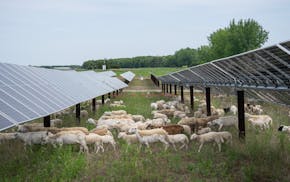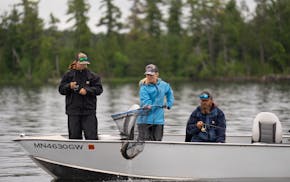One year after Minnesota grouse hunters enjoyed a phenomenal harvest, they're settling in for a season that they can only hope will be fair to good.
"It seems like there are patches that are good, but there's also patches that are as bad as we have seen in a while," said Nate Huck, resident game bird consultant for the state Department of Natural Resources in Brainerd. "I've been telling people if they feel like bird numbers aren't there, pick up and move 10 miles."
For upland bird hunters across the United States, Minnesota is one of the true promised lands for chasing ruffed grouse. The season opened Sept. 14 and runs through New Year's Day. The well-camouflaged woodland birds are pursued by an average of 72,000 license holders per year. Last year's harvest exceeded 339,500 birds, a 43% leap from 2022′s good season.
Huck said wildlife managers across northern Minnesota were pleased in late April and early May of this year when ruffed grouse drumming counts equaled or exceeded the strong counts recorded at the same time and on the same routes in 2023. The muffled sounds of distant drumming by males — a mating ritual — provide wildlife managers a dependable way to gauge how many birds survived the winter.
At Red Lake Wildlife Management Area (WMA) in the far north, DNR staff conducted drumming count surveys at six locations in the Beltrami Island State Forest and Red Lake WMA's woods. They counted an average of 2.5 drums per stop, higher than last year's 1.7 drums at the same local listening locations. Statewide, the DNR has said, 2023 and 2024 counts were similar, averaging 2.3 drums per stop.
"We had such good drumming counts," said Charlie Tucker, DNR's area wildlife manager at Red Lake WMA. "I was really optimistic."
Then came the rain. For ruffed grouse in Minnesota's core northern territories, the first week of June is peak time for chicks to hatch. Staggering rains that rolled across the region at that time created high mortality. Tucker and Huck both said the survivors of each year's hatch make up a large percentage of the grouse taken by hunters in the fall. In other words, they can make or break the harvest.
"The rain we had in June seemed like it was special-ordered to kill our reproduction," Tucker said. "You couldn't pick worse timing."
Huck said a lot of hunters told him late last year that 2023 conditions provided the best hunting they had experienced in 40 years. Besides great abundance, scarce snowfall and mild temperatures through December offered extra opportunities to go afield. Over the course of the 3½-month season, the mean harvest was seven grouse per successful hunter — two birds better than the 10-year average, according to the DNR's annual mail-in survey of small-game hunters.
Despite the obvious decline in young grouse this year, Huck and Tucker both said many hunters will have good experiences this fall and early winter.
"My personal observation? It's OK," said Tucker, who noted that the state this year added 7 new miles of hunter walking trails in his area.
"It's good. It's not great," Huck said.
They also said there's enough adult grouse on the landscape to stage a recovery of reproduction next spring. In the roughly 10-year population cycle for ruffed grouse in Minnesota, the DNR says a low population in 2021 suggests that the statewide cycle is still on the upswing.
Both upland bird experts said it's too early to tell how American woodcock hunters will do in the state this fall. The softball-sized woodland birds inhabit Minnesota in loose colonies, but hunter success varies according to the migration of larger concentrations of woodcock from Manitoba and Ontario. Typically, the birds fly into Minnesota when cold winds start to blow from the north. As of this week, the flight had not begun.
"We do see a large number of birds push through Minnesota," Huck said. "It's all based on the weather. I just look to the north winds."

Xcel lets loose a small army of hungry sheep to keep its solar farm in order

Anderson: In early June, Minnesota fish are begging to be caught. Won't you help?

So you want to get an e-bike? Here's what you should know in Minnesota
Baby opossums are emerging from their mothers' pouches

